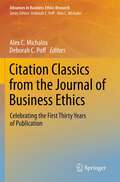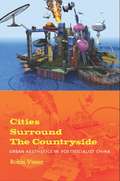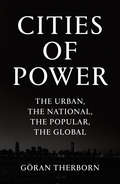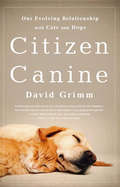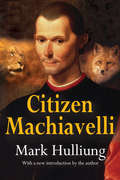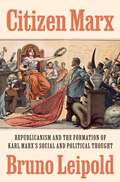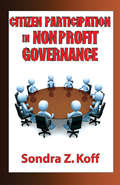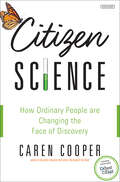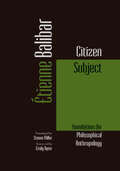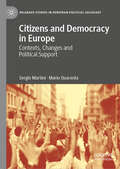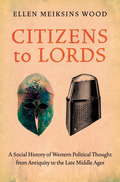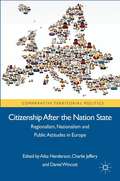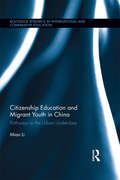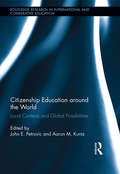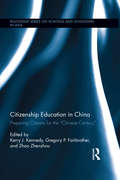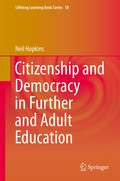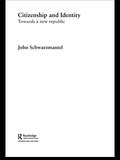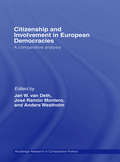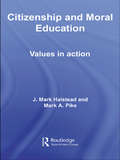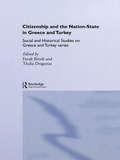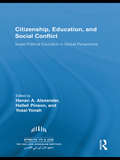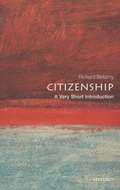- Table View
- List View
Citation Classics from the Journal of Business Ethics: Celebrating the First Thirty Years of Publication (Advances in Business Ethics Research #2)
by Alex C. Michalos Deborah C PoffThe Journal of Business Ethics was founded by Alex C. Michalos and Deborah C. Poff and published its first issue in March 1982. It is the most frequently cited business ethics journal in the world. The Journal has always offered a multi-disciplinary and international public forum for the discussion of issues concerning the interaction of successful business and moral virtue. Its authors and readers are primarily scholars and students in social sciences and philosophy , with special interests in the interaction of these disciplines with business or corporate responsibility. Since the field of business ethics grew simultaneously with the growth of the Journal, a collection of its most cited articles is tantamount to a collection of the articles that had the greatest influence in defining the field over its first 30 years of development. In this anniversary volume, an overview of citation classics from the Journal is presented, the 33 most frequently cited articles are reproduced and brief reflections on the impact of the Journal on the field are given from over 100 scholars who authored citation classics and/or distinguished papers, as well as those who served on the Editorial Board and/or are recognized as leaders in the field.
Cities Surround the Countryside: Urban Aesthetics in Postsocialist China
by Robin VisserDenounced as parasitical under Chairman Mao and devalued by the norms of traditional Chinese ethics, the city now functions as a site of individual and collective identity in China. Cities envelop the countryside, not only geographically and demographically but also in terms of cultural impact. Robin Visser illuminates the cultural dynamics of three decades of radical urban development in China. Interpreting fiction, cinema, visual art, architecture, and urban design, she analyzes how the aesthetics of the urban environment have shaped the emotions and behavior of people and cultures, and how individual and collective images of and practices in the city have produced urban aesthetics. By relating the built environment to culture, Visser situates postsocialist Chinese urban aesthetics within local and global economic and intellectual trends. In the 1980s, writers, filmmakers, and artists began to probe the contradictions in China's urbanization policies and rhetoric. Powerful neorealist fiction, cinema, documentaries, paintings, photographs, performances, and installations contrasted forms of glittering urban renewal with the government's inattention to a livable urban infrastructure. Narratives and images depicting the melancholy urban subject came to illustrate ethical quandaries raised by urban life. Visser relates her analysis of this art to major transformations in urban planning under global neoliberalism, to the development of cultural studies in the Chinese academy, and to ways that specific cities, particularly Beijing and Shanghai, figure in the cultural imagination. Despite the environmental and cultural destruction caused by China's neoliberal policies, Visser argues for the emergence of a new urban self-awareness, one that offers creative resolutions for the dilemmas of urbanism through new forms of intellectual engagement in society and nascent forms of civic governance.
Cities of Power: The Urban, The National, The Popular, The Global
by Goran TherbornWhy are cities centres of power? A sociological analysis of urban politicsWhy are some cities more powerful than others? What makes a capital city different from others in a nation state? In this brilliant survey of urban politics, leading sociologist Göran Therborn looks at what makes a metropolis. Through a historical lens and a global perspective, Therborn questions received assumptions about the source of urban power and how it manifests itself. He looks at the way that architecture and social movements have had their impact on the way cities work. He explores what makes a ‘global city’. And argues that, at a time when they seem to be moving apart, there is a strong link between the city and the nation state. With examples from revolutionary Paris to the rise of the post-colonial capitals of the Global South and the mega cities of the twenty first century, Therborn forces us to think about what our urban future might look like.From the Hardcover edition.
Cities of Words Pedagogical Letters on a Register of the Moral Life
by Stanley CavellSince Socrates and his circle first tried to frame the Just City in words, discussion of a perfect communal life--a life of justice, reflection, and mutual respect--has had to come to terms with the distance between that idea and reality. Measuring this distance step by practical step is the philosophical project that Stanley Cavell has pursued on his exploratory path. Situated at the intersection of two of his longstanding interests--Emersonian philosophy and the Hollywood comedy of remarriage--Cavell's new work marks a significant advance in this project. The book--which presents a course of lectures Cavell presented several times toward the end of his teaching career at Harvard--links masterpieces of moral philosophy and classic Hollywood comedies to fashion a new way of looking at our lives and learning to live with ourselves. This book offers philosophy in the key of life. Beginning with a rereading of Emerson's "Self-Reliance," Cavell traces the idea of perfectionism through works by Plato, Aristotle, Locke, Kant, Mill, Nietzsche, and Rawls, and by such artists as Henry James, George Bernard Shaw, and Shakespeare. Cities of Words shows that this ever-evolving idea, brought to dramatic life in movies such as It Happened One Night, The Awful Truth, The Philadelphia Story, and The Lady Eve, has the power to reorient the perception of Western philosophy.
Citizen Canine: Our Evolving Relationship with Cats and Dogs
by David GrimmDogs are getting lawyers. Cats are getting kidney transplants. Could they one day be fellow citizens?Cats and dogs were once wild animals. Today, they are family members and surrogate children. A little over a century ago, pets didn't warrant the meager legal status of property. Now, they have more rights and protections than any other animal in the country. Some say they're even on the verge of becoming legal persons.How did we get here-and what happens next?In this fascinating exploration of the changing status of dogs and cats in society, pet lover and award-winning journalist David Grimm explores the rich and surprising history of our favorite companion animals. He treks the long and often torturous path from their wild origins to their dark days in the middle ages to their current standing as the most valued animals on Earth. As he travels across the country-riding along with Los Angeles detectives as they investigate animal cruelty cases, touring the devastation of New Orleans in search of the orphaned pets of Hurricane Katrina, and coming face-to-face with wolves and feral cats-Grimm reveals the changing social attitudes that have turned pets into family members, and the remarkable laws and court cases that have elevated them to quasi citizens.The journey to citizenship isn't a smooth one, however. As Grimm finds, there's plenty of opposition to the rising status of cats and dogs. From scientists and farmers worried that our affection for pets could spill over to livestock and lab rats to philosophers who say the only way to save society is to wipe cats and dogs from the face of the earth, the battle lines are being drawn. We are entering a new age of pets-one that is fundamentally transforming our relationship with these animals and reshaping the very fabric of society.For pet lovers or anyone interested in how we decide who gets to be a "person" in today's world, Citizen Canine is a must read. It is a pet book like no other.
Citizen Machiavelli
by Mark HulliungMachiavelli has been viewed as the forerunner of the humanists of our day, liberals and socialists, who have discovered that moral ends sometimes require immoral means. Against this interpretation, Mark Hulliung argues that Machiavelli's "humanism," was rooted in classical notions of grandeur and greatness, and that his prime reason for admiring the ancient Roman republic was that it conquered the world. In short, Machiavelli was at his most Machiavellian precisely when he voiced his "civic humanism."Hulliung argues that Machiavelli's embrace of fraud and violence cannot be justified by patriotism or a professed concern with the common good. He indicts Machiavelli's use and abuse of history in the service of his cynical agenda the quest for power. Hulliung sees Machiavelli as a republican imperialist, embracing the heroic pagan virtues and consciously subverting the humanistic tradition of Cicero, and the religious morality of Christianity, with an intentionally skewed interpretation of republican Rome.By inverting the Stoical and Christian elements of the classics, Machiavelli made the humanistic tradition give birth to Machiavellism, its terrible child. Hulliung's thesis is convincing, and his book is a valuable contribution to the debate on Machiavellian thought.
Citizen Marx: Republicanism and the Formation of Karl Marx’s Social and Political Thought
by Bruno LeipoldThe first book to offer a comprehensive exploration of Marx&’s relationship to republicanism, arguing that it is essential to understanding his thoughtIn Citizen Marx, Bruno Leipold argues that, contrary to certain interpretive commonplaces, Karl Marx&’s thinking was deeply informed by republicanism. Marx&’s relation to republicanism changed over the course of his life, but its complex influence on his thought cannot be reduced to wholesale adoption or rejection. Challenging common depictions of Marx that downplay or ignore his commitment to politics, democracy, and freedom, Leipold shows that Marx viewed democratic political institutions as crucial to overcoming the social unfreedom and domination of capitalism. One of Marx&’s principal political values, Leipold contends, was a republican conception of freedom, according to which one is unfree when subjected to arbitrary power.Placing Marx&’s republican communism in its historical context—but not consigning him to that context—Leipold traces Marx&’s shifting relationship to republicanism across three broad periods. First, Marx began his political life as a republican committed to a democratic republic in which citizens held active popular sovereignty. Second, he transitioned to communism, criticizing republicanism but incorporating the republican opposition to arbitrary power into his social critiques. He argued that although a democratic republic was not sufficient for emancipation, it was necessary for it. Third, spurred by the events of the Paris Commune of 1871, he came to view popular control in representation and public administration as essential to the realization of communism. Leipold shows how Marx positioned his republican communism to displace both antipolitical socialism and anticommunist republicanism. One of Marx&’s great contributions, Leipold suggests, was to place politics (and especially democratic politics) at the heart of socialism.
Citizen Participation in Non-profit Governance
by Sondra Z. KoffNonprofit organizations, their governing structures, boards of directors, and their newest constituency, members who represent the public at large, are the subject of this book. In recent years, new mechanisms have been developed to link citizens with government and with diverse policy-making entities. Earlier, it was assumed that citizens had little interest in policy deliberations, and responsibility for public needs was best left to the experts. Many citizens now believe that they have a legitimate right to infl uence how power is exercised in public organizations. Koff constructs a demographic profi le of public members, their activities, and their opinions about board membership. She also catalogues the perspectives of executive directors about public members, identifi es specifi c problems related to public participation, and suggests strategies to help resolve them. How effectively these bodies perform, and how well they respond to the public, are in part determined by the talents and activities of their members. All of these members, especially public members, need appropriate tools to be able to perform in a superior fashion. Despite the importance of governing bodies to an organization's performance, there has been little examination of board members in general and specifi cally of public members. This is the first book-length study on the subject.
Citizen Science: How Ordinary People are Changing the Face of Discovery
by Caren CooperThe engaging history of the people whose contributions to scientific pursuits make us rethink the meaning of the word "scientist." Think you need a degree in science to contribute to important scientific discoveries? Think again. All around the world, in fields ranging from astronomy to zoology, millions of everyday people are choosing to participate in the scientific process. Working in cooperation with scientists in pursuit of information, innovation, and discovery, these volunteers are following protocols, collecting and reviewing data, and sharing their observations. They are our neighbors, our in-laws, and people in the office down the hall. Their story, along with the story of the social good that can result from citizen science, has largely been untold, until now. Citizen scientists are challenging old notions about who can conduct research, where knowledge can be acquired, and even how solutions to some of our biggest societal problems might emerge. In telling their story, Cooper will inspire readers to rethink their own assumptions about the role that individuals can play in gaining scientific understanding and putting that understanding to use as stewards of our world. Citizen Science will be a rallying call-to-arms, and will also function as an authoritative resource for those inspired by the featured stories and message.
Citizen Subject: Foundations for Philosophical Anthropology (Commonalities)
by Étienne BalibarWhat can the universals of political philosophy offer to those who experience "the living paradox of an inegalitarian construction of egalitarian citizenship"? Citizen Subject is the summation of Étienne Balibar’s career-long project to think the necessary and necessarily antagonistic relation between the categories of citizen and subject. In this magnum opus, the question of modernity is framed anew with special attention to the self-enunciation of the subject (in Descartes, Locke, Rousseau, and Derrida), the constitution of the community as “we” (in Hegel, Marx, and Tolstoy), and the aporia of the judgment of self and others (in Foucualt, Freud, Kelsen, and Blanchot).After the “humanist controversy” that preoccupied twentieth-century philosophy, Citizen Subject proposes foundations for philosophical anthropology today, in terms of two contrary movements: the becoming-citizen of the subject and the becoming-subject of the citizen. The citizen-subject who is constituted in the claim to a “right to have rights” (Arendt) cannot exist without an underside that contests and defies it. He—or she, because Balibar is concerned throughout this volume with questions of sexual difference—figures not only the social relation but also the discontent or the uneasiness at the heart of this relation. The human can be instituted only if it betrays itself by upholding “anthropological differences” that impose normality and identity as conditions of belonging to the community.The violence of “civil” bourgeois universality, Balibar argues, is greater (and less legitimate, therefore less stable) than that of theological or cosmological universality. Right is thus founded on insubordination, and emancipation derives its force from otherness.Ultimately, Citizen Subject offers a revolutionary rewriting of the dialectic of universality and differences in the bourgeois epoch, revealing in the relationship between the common and the universal a political gap at the heart of the universal itself.
Citizens and Democracy in Europe: Contexts, Changes and Political Support (Palgrave Studies in European Political Sociology)
by Mario Quaranta Sergio MartiniThis book provides an innovative and in-depth analysis of how attitudes towards democracy and political institutions differ across 31 countries in Europe, and how these attitudes have fluctuated over time. After addressing conceptual and measurement issues about the evaluative dimension of political support, the authors develop a unique framework assessing the role of the institutional format, the quality of the political process, macro-economic conditions and inequality to explain trends and differences in political satisfaction and trust. The book further explores how education, employment and electoral status create gaps in political support. Citizens and Democracy in Europe will be of interest to students and scholars in comparative politics, political sociology and public opinion.
Citizens and Nation
by Gerald FriesenGrandmother Andre told stories in front of a campfire. Elizabeth Goudie wrote a memoir in school scribblers. Phyllis Knight taped hours of interviews with her son. Today's families rely on television and video cameras. They are all making history.In a different approach to that old issue, 'the Canadian identity,' Gerald Friesen links the media studies of Harold Innis to the social history of recent decades. The result is a framework for Canadian history as told by ordinary people. Friesen suggests that the common peoples' perceptions of time and space in what is now Canada changed with innovations in the dominant means of communication. He defines four communication-based epochs in Canadian history: the oral-traditional world of pre-contact Aboriginal people; the textual-settler household of immigrants; the print-capitalism of the nineteenth and twentieth centuries; and the screen-capitalism that has emerged in the last few decades. This analysis of communication is linked to distinctive political economies, each of which incorporates its predecessors in an increasingly complex social order.In each epoch, using the new communication technologies, people struggled to find the political means by which they could ensure that they and their households survived and, if they were lucky, prospered. Canada is the sum of their endeavours. "Citizens and Nation" demonstrates that it is possible to find meaning in the nation's past that will interest, among others, a new, young, and multicultural reading audience.
Citizens of Worlds: Open-Air Toolkits for Environmental Struggle
by Jennifer GabrysAn unparalleled how-to guide to citizen-sensing practices that monitor air pollution Modern environments are awash with pollutants churning through the air, from toxic gases and intensifying carbon to carcinogenic particles and novel viruses. The effects on our bodies and our planet are perilous. Citizens of Worlds is the first thorough study of the increasingly widespread use of digital technologies to monitor and respond to air pollution. It presents practice-based research on working with communities and making sensor toolkits to detect pollution while examining the political subjects, relations, and worlds these technologies generate. Drawing on data from the Citizen Sense research group, which worked with communities in the United States and the United Kingdom to develop digital-sensor toolkits, Jennifer Gabrys argues that citizen-oriented technologies promise positive change but then collide with entrenched and inequitable power structures. She asks: Who or what constitutes a &“citizen&” in citizen sensing? How do digital sensing technologies enable or constrain environmental citizenship? Spanning three project areas, this study describes collaborations to monitor air pollution from fracking infrastructure, to document emissions in urban environments, and to create air-quality gardens. As these projects show, how people respond to, care for, and struggle to transform environmental conditions informs the political subjects and collectives they become as they strive for more breathable worlds.
Citizens to Lords
by Ellen Meiksins WoodIn this groundbreaking work, Ellen Meiksins Wood lays out her innovative approach to the history of political theory and traces the development of the Western tradition from classical antiquity through the late Middle Ages. Her "social history" is a significant departure from other contextual interpretations. Treating canonical thinkers as passionately engaged human beings, Wood examines their ideas not simply in the context of political discourse but as creative responses to the social relations and conflicts of their time and place. From the Ancient Greek polis of Plato and Aristotle, through the Roman Republic of Cicero and the Empire of St. Paul and St. Augustine, to the medieval world of Averroes, Thomas Aquinas and William of Ockham, Citizens to Lords offers a rich, dynamic exploration of thinkers and ideas that have stamped their imprint upon history and the present day.
Citizenship After The Nation State
by Ailsa Henderson Charlie Jeffery Daniel WincottOffering an confrontation of the uncritical choice of the 'nation-state' as a unit of analysis in postwar social science, this book utilises specially collected data from 14 regions across five European states to explores how citizens define and pursue collective goals at regional scale as well as at the scale of the 'nation-state'.
Citizenship Education and Migrant Youth in China: Pathways to the Urban Underclass (Routledge Research in International and Comparative Education)
by Miao LiIn East Asian economies such as China, recent mass rural-urban migration has created a new urban underclass, as have their children. However, their inclusion in urban public schools is a surprisingly slow process, and youth identities in newly industrialized countries remain largely neglected. Faced with monetary and institutional barriers, the majority of migrant youth attend low-quality or underperforming migrant schools, without access to the free compulsory education enjoyed by their urban counterparts. As a result, China’s citizen-building scheme and the sustainability of its labor-intensive economy have greatly impacted global economic restructuring. Using thorough ethnographic research, this volume examines the consequences of urban schooling and citizenship education through which school and social processes contribute to the production of unequal class relations. It explores the nexus of citizenship education and identity-forming practices of poor migrant youth in an attempt to foresee the new class formation in Chinese society. This volume opens up the "black box" of citizenship education in China and examines the effect of school and societal forces on social mobility and life trajectories.
Citizenship Education around the World: Local Contexts and Global Possibilities (Routledge Research in International and Comparative Education)
by John E. Petrovic Aaron M. KuntzThough certainly not a new idea, citizenship education manifests in unique and often unpredictable ways in our contemporary neoliberal era. The question of what it means to be a productive and recognized citizen must now be understood simultaneously along both global and local lines. This edited volume offers an international perspective on citizenship education enacted in specific socio-political contexts. Each chapter includes a pointed conceptualization of citizenship education—a philosophical framework—that is then applied to specific national cases across Europe, Asia, Canada and more. Chapters emphasize how such frameworks are implemented within local contexts, encouraging particular pedagogical/curricular practices even as they constrain others. Chapters conclude with suggestions for productive change and how educators might usefully engage contemporary contexts through citizenship education.
Citizenship Education in China: Preparing Citizens for the "Chinese Century" (Routledge Series on Schools and Schooling in Asia)
by Kerry J. Kennedy Gregory P. Fairbrother Zhao ZhenzhouThere is a flourishing literature on citizenship education in China that is mostly unknown in the West. Liberal political theorists often assume that only in democracy should citizens be prepared for their future responsibilities, yet citizenship education in China has undergone a number of transformations as the political system has sought to cope with market reforms, globalization and pressures both externally and within the country for broader political reforms. Over the past decade, Chinese scholars have been struggling for official recognition of citizenship education as a key component of the school curriculum in these changing contexts. This book analyzes the citizenship education issues under discussion within China, and aims to provide a voice for its scholars at a time when China’s international role is becoming increasingly important.
Citizenship and Democracy in Further and Adult Education (Lifelong Learning Book Series #18)
by Neil HopkinsThis book addresses the questions why citizenship education is an important subject for students in further and adult education and why we need democratic colleges to support the study of citizenship education. It investigates the historical roots of further and adult education and identifies how the adoption of citizenship education in the post-compulsory sector can enrich vocational studies in further education and programmes in adult education. It is argued that democratic colleges are vital to ensure that citizenship education informs the decision-making process throughout educational institutions (and as a means of establishing fair and equal representation for important stakeholders). The author has worked in both sectors for over a decade, and uses this experience to offer a blend of educational practice and philosophical investigation. The result is a work that appeals to both teachers in further and adult education as well as academics and students interested in philosophy of education.
Citizenship and Identity: Towards a New Republic (Routledge Innovations in Political Theory)
by John SchwarzmantelCitizenship and Identity offers an analysis of contemporary politics and of the scepticism and apathy which characterise the political life of modern democracies. Starting from exploration of liberal-democracy and a critique of the fragmentation of contemporary politics, this book develops a republican perspective as an alternative framework for political institutions and civic participation.
Citizenship and Involvement in European Democracies: A Comparative Analysis (Routledge Research in Comparative Politics #Vol. 17)
by Jan W. van Deth José Ramón Montero Anders WestholmThis unique study presents the results of a cross-national analysis of citizenship and participation among citizens in twelve European democracies. Research on the future and quality of contemporary democracy is usually restricted to focus either on political participation, on particular aspects of citizenship, or on social activities, exclusively. This new book offers the first empirical investigation of the relationships both between social and political involvement, and between ‘small-scale’ and ‘large-scale’ democracies. Citizenship and Involvement in European Democracies offers representative samples of the populations in a selection of European countries between 2000-2002, including: Denmark, Germany (East and West), Moldova, the Netherlands, Norway, Portugal, Romania, Russia, Slovenia, Spain, Sweden, and Switzerland. The leading contributors provide new theoretical insights and offer a broad conceptualization of citizenship, stimulating the ongoing discussions about the problems and challenges of democratic political systems. This book has a companion volume entitled Social Capital and Associations in European Democracies edited by William A. Maloney and Sigrid Roßteutscher (Routledge, 2006). Both volumes will be of great interest to students and researchers of European politics, comparative politics and sociology.
Citizenship and Moral Education: Values in Action
by Mark Halstead Mark PikeMoral and citizenship education are again at the forefront of educational attention with the recent governmental announcements about revisions to the National Curriculum frameworks to 2000 and beyond. This book addresses some of the central issues in moral and citizenship education facing teachers today, embedding practical considerations in a theoretical context and reviewing teaching, learning and assessment strategies. It draws extensively on research but is written in a clear, accessible style.Citizenship and Moral Education examines the key concepts and provides an up-to-date overview of policy, particularly addressing: theoretical issues, aims and approaches in relation to moral and citizenship education in a pluralist society the contributions of the curriculum, extra-curricular activities and the school ethos to citizenship and moral education in school teaching strategies, materials, pupil assessment and school evaluation. The book also focuses on key professional and personal issues for teachers in undertaking moral citizenship education.
Citizenship and the Nation-State in Greece and Turkey
by Faruk Birtek Thalia DragonasCitizenship and the Nation State in Greece and Turkey brings together papers on a transdisciplinary dialogue on nation formation in Greece and Turkey as successor states of the Ottoman Empire, and on aspects of civil society in the two countries.The volume is divided into two parts: 'Empire and Nation-State' and 'Nation and Civil Society' and covers issues such as Turkish and Greek nationalism, the formation of the Greek State, the impact of the Greek War of Independence in transforming the Ottoman Empire, civil society in Greece during the post-World War II period, the concept of citizenship as far as the rights of women are concerned in Greece and in Turkey, and the production and reproduction of nation in the educational discourse.
Citizenship, Education and Social Conflict: Israeli Political Education in Global Perspective (Routledge Research in Education)
by Hanan A. AlexanderThis volume provides new perspectives into the challenges of citizenship education in the age of globalization and in the context of multicultural and conflict-ridden societies. It calls on us to rethink the accepted liberal and national discourses that have long dominated the conceptualization and practice of citizenship and citizenship education in light of social conflict, globalization, terrorism, and the spread of an extreme form of capitalism. The contributors of the volume identify the main challenges to the role of citizenship education in the context of globalization, conflicts and the changes to the institution of citizenship they entail and critically examine the ways in which schools and education systems currently address – and may be able to improve – the role of citizenship education in conflict-ridden and multicultural contexts.
Citizenship: A Very Short Introduction
by Richard BellamyInterest in citizenship has never been higher. Politicians of all stripes stress its importance, as do church leaders, captains of industry and every kind of campaigning group--from those supporting global causes, such as tackling world poverty, to others with a largely local focus, such as combating neighborhood crime. In this brilliant, compact introduction, Richard Bellamy offers an eye-opening look at an idea that is as important as it is rare--the prospect of influencing government policy according to reasonably fair rules and on a more or less equal basis with others. Bringing together the most recent scholarship, the book sheds light on how ideas of citizenship have changed through time from ancient Greece to the present, looks at concepts such as membership and belonging, and highlights the relation between citizenship, rights, and democracy. Bellamy also examines the challenges confronting the very possibility of citizenship today, the impact of globalization, the desirability of "global citizenship," the teaching of citizenship in schools, citizenship tests for immigrants, and the many different definitions and types of citizenship in modern society.
